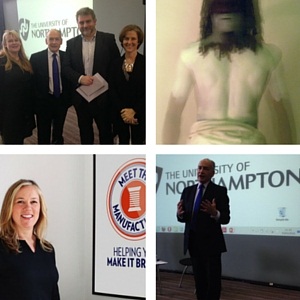Subject Futures Week 2016: Industry contacts flock to Northampton
Date 29.01.2016

The annual ‘Subject Futures Week’, a week long intensive focus on graduate career opportunities within the creative industries has kicked off for 2016.
Monday 25 January saw leading industry figures and recent graduates from the University of Northampton share their knowledge and professional experience of the creative industries, lifting the lid on what professional life will be like for our students after graduation.
The jewel in the broadcasting crown for day one was acclaimed broadcast journalist, Alastair Stewart. Alastair talked about his career and how it has progressed since the 1970s, particularly in the last few years with social media becoming a dominant part of news reporting. Alastair shared his thoughts on what he cites as being one of the most pivotal moments of his career: the fall of the Berlin Wall.
Alastair also shared his most memorable incident of reporting with no script or concrete facts, the Lockerbie bombing, sharing his experience of reporting that day, the first reports came in of a petrol station fire, then that a plane had crashed and other facts began to come through bit by bit. Reporting in this way, Alastair feels is it’s the best kind of reporting.
When asked by a student if he still gets nervous: “The moment you no longer feel nervous when the red light comes on is the moment you should stop doing it.”
When asked what he wants to do after ITN: “I would like to step away from being Alastair Stewart, the ITN news reader and write a newspaper column as I like debates and politics. That way I can say what I’ve really been thinking for the last 40 years!”
Another industry leader speaking to students today was Abdul Hkaim Onitolo, a Nigerian artist who’s practice is very much self-driven by the ‘why’ within the practice, meshing cultures and mediums to create his works. Speaking to students he said: “For artists, the sky is the limit, but you have to always come back to the ‘why’ of the creation of your work.
The University also welcomed Kate Hills, Founder and Editor of Make It British, who encouraged our students to consider where their clothes are made and at what cost.
After 20 years working in fashion – both as a designer and a buyer – Kate put her expertise, contacts and passion for homegrown textiles into action; founding the Make It British website in 2011.
Make it British aims to promote British craftsmanship, encouraging consumers and retailers to see the true value of keeping manufacture in Britain, rather than outsourcing textile work abroad. “Manufacturing in the UK is thriving, cost-effective and sustainable,” enthused Kate, before sharing examples from Northampton’s shoe industry, Mulberry’s expansion plans and Burberry’s new trench coat factory due to open in Leeds.
Kate answered questions from the audience regarding her career and the fashion industry; from the ‘true cost’ of getting fashion items to the UK (items take weeks and weeks to arrive by container ship from the Far East, but if trends change and a retailer needs an item sooner, then the stock will be sent via air – emitting 5,000 per cent more Co2 per metric tonne), to the reasons top designers such as Raymond Mouret, Victoria Beckham and Vivienne Westwood have their clothes made in the UK (“It’s about quality, the small manufacturing runs, speed and trust.”)
“How many British clothing brands can you name? How many of the clothes you are wearing were made in Britain?” Kate asked the audience. “By buying authentic British goods, manufactured by skilled craftsman using the finest materials, you are helping to keep these skills alive in the UK. If you don’t support those makers in Britain that still have these precious skills, you will lose them forever.”
To keep up to date with the buzz surrounding Subject Futures Week, use the #SFW2016.
—
Pictured clockwise from top left: Alastair Stewart with the UN Journalism team, artwork by Abdul Hkaim Onitolo, Alastair Stewart onstage, Kate Hills of Make It British.